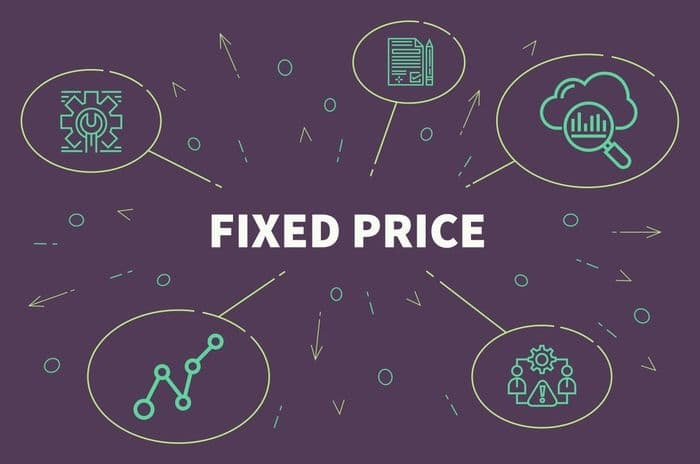Few major broadband providers offer fixed price broadband now, and availability can be limited, so it may only be an option for some customers.
Rebel, iTalk, Fibrus, and Hyperoptic, all offer fixed price broadband, yet most other providers have moved to annual price rises for in-contract customers.
Many smaller alt-nets also offer fixed broadband, but coverage is much more limited, with availability only in select areas.

At a glance: fixed price broadband
Only a few broadband providers with wide coverage offer fixed price broadband, while a couple of others are more open, with customers at least given the choice to leave if prices do go up.
| Availability | Price rise condition | |
|---|---|---|
| Rebel Internet | Nationwide | Fixed prices for the minimum term |
| iTalk Telecom | Nationwide | Fixed prices for the minimum term |
| Fibrus | Northern Ireland & Cumbria | Fixed prices for the minimum term |
| Hyperoptic | Urban centres | Fixed prices for the minimum term |
| Zen Internet | Nationwide | Fixed prices for the minimum term |
| Lit Fibre | Nationwide (CityFibre) | Fixed prices for the minimum term |
| Hey! Broadband | Urban towns in the South East of England | Fixed prices for the minimum term |
| Airband | Rural areas in the South West of England | Fixed prices for the minimum term |
| BeFibre | Broad coverage in towns across England | Fixed prices for the minimum term |
| Quickline | Rural Yorkshire and Lincolnshire | Fixed prices for the minimum term |
| Trooli | Rural and semi-rural towns in the South East of England | Fixed prices for the minimum term |
| Brsk | North West towns and cities | Fixed prices for the minimum term |
| LightSpeed Broadband | Small towns in East Anglia | Fixed prices for the minimum term |
| TalkTalk (superfast plans only) |
Nationwide (without Openreach FTTP) | Fixed Price Plus for £4/mth |
| Sky | Nationwide | Prices may change during the contract |
| NOW Broadband | Nationwide | Prices may change during the contract |
| Gigaclear | Rural villages in South England | Prices may change during the contract |
Rebel Internet, iTalk, and Zen Internet, are all nationally available broadband providers with both part-fibre and full fibre Openreach coverage. Other options include Fibrus and Hyperoptic, although availability is more restricted to select areas.
Smaller, much more locally based, independent networks are also keen to win new customers and commonly offer no mid-contract price hikes. This includes Hey! Broadband, Lit Fibre, Airband, BeFibre, Quickline, Trooli, Brsk, and LightSpeed, who all appear in our free broadband comparison tool if they're available to you.
In the following guide, we've looked at why broadband prices go up and which providers impose annual price rises.
Fixed price broadband deals
Promises of no mid-contract price hikes are much less common than they used to be, with almost all broadband providers in the UK having switched to in-contract annual price rises over the last few years.
While Ofcom have now banned inflation-linked and percentage-based mid-contract price rises, providers are now just moving to pounds and pence-based rises instead. With few choosing to give up on the practice.
Yet, there are still broadband providers available who do offer fixed price broadband packages. Let's look at these exceptions to the rule, and see which providers pledge to keep customers' prices the same during their contracts.
Rebel Internet
Rebel are a new broadband provider, with nationwide availability offering both part-fibre and full fibre connections in Openreach network areas.
They promise no mid-contract price hikes on all their plans for the duration of the minimum term, and two of their most popular deals are priced:
| Package | Broadband | Monthly price | Upfront price | Contract term | |
|---|---|---|---|---|---|
 |
Rebel 115 | 115Mb average | £35 | Free | 24 months |
 |
Rebel 1000 | 1Gb average | £55 | Free | 24 months |
Rebel focus on offering customers decent equipment, utilising Plume Super WiFi Pods and a WiFi 6 enabled router. New customers can also get an Amazon Gift Card when they sign up through the links above.
iTalk Telecom
iTalk are a small broadband provider, but they resell access over the Openreach network, giving them national coverage of both part fibre and full fibre broadband deals.
They're a good choice for fixed price broadband as most people will be able to get them. Here are two of their more popular deals:
| Package | Broadband | Monthly price | Upfront price | Contract term | |
|---|---|---|---|---|---|
 |
Full Fibre 115 | 115Mb average | £30.99 | £18.95 | 18 months |
 |
Full Fibre 250 | 220Mb average | £39.99 | £18.95 | 24 months |
iTalk contracts are also 24-months in length, so customers can be reassured their broadband price won't go up for two years.
Read more in our review of iTalk broadband.
Fibrus
Fibrus are an independent full fibre network, with availability mostly focused in Northern Ireland where they cover around 40% of premises. However, they're also now actively building in Cumbria and the North of England.
They specifically advertise no mid-contract price rises, and say prices won't go up during a customer's minimum term period. Contracts also run for 24 months.
Here are some of Fibrus' broadband deals:
| Package | Broadband | Monthly price | Upfront price | Contract term | |
|---|---|---|---|---|---|

|
Full Fibre 100 | 106Mb average | £24.99 | Free | 12 months |

|
Full Fibre 500 | 518Mb average | £29.99 | Free | 12 months |
While prices won't go up during the 24-month minimum term, Fibrus do impose out of contract price rises, which can range from £10 to £15 extra per month depending on the package, so customers should be aware of this.
Read our full review of Fibrus broadband.
Hyperoptic
Hyperoptic have actively campaigned against no mid-contract price rises and have made it one of their major selling points.
It's extremely unlikely due to their marketing activity around fixed prices for this approach to change, as they also campaign for Ofcom, the ASA and CAP to further protect consumers against annual price rises.
Here are a few of Hyperoptic's main fixed price broadband deals:
| Package | Broadband | Monthly price | Upfront price | Contract term | |
|---|---|---|---|---|---|

|
Light 30Mb (24 months) | 33Mb average | £17.99 | £10 | 24 months |

|
Superfast (24 months) | 159Mb average | £26 | £19 | 24 months |
Hyperoptic promise no mid-contract price hikes and guarantee that the advertised price of the broadband package at the start of the minimum term will remain the same until the contract ends.
At the end of a minimum term prices will increase to the out of contract price quoted at the time of ordering. However, it's also worth being aware Hyperoptic's terms of service reserve the right to increase prices at any time.
Read our full review of Hyperoptic broadband.
Zen Internet
Zen Internet promise no price rises for the life of the contract. However, they dropped their lifetime price guarantee in May 2022, so customers outside of a minimum term may now see prices rise.
Zen Internet are one of the fixed price broadband providers with wide availability across the UK, as they resell connections on the Openreach network.
However, Zen's pricing is also very expensive compared to other broadband providers, so it could be a false economy to pick them for their fixed prices over a cheaper provider.
TalkTalk
TalkTalk have applied annual price rises of CPI + 3.7% to their contracts since early 2021, and have now moved new contracts to a price rise policy of £3 per month in April of each year.
However, they also offer customers an add-on called 'Fixed Price Plus', which is available on their part-fibre superfast plans, and can be added during the online checkout process.
Costing £4 per month, Fixed Price Plus promises not to increase prices during the minimum term at all, and then not to increase prices above inflation when the customer becomes out of contract with them.
| Package | Broadband | Monthly price | Upfront price | Contract term | |
|---|---|---|---|---|---|

|
Fibre 35 | 38Mb average | £28 | Free | 18 months |

|
Fibre 65 | 67Mb average | £28 | Free | 18 months |
During periods of high inflation TalkTalk's Fixed Price Plus add-on has offered fair value for money. However, with a move to £3 per month annual price rises, it's easy to see an add-on costing £4 per month extra, isn't going to save customers a lot of money, even on an 18-month contract.
The add-on isn't available on any of TalkTalk's full fibre plans and seems to only be available with one of TalkTalk's Fibre 35 or Fibre 65 packages, so customers will need to still be in a part-fibre area.
Sky
Sky state that "prices may rise during a contract", but don't specify a particular amount.
In 2024, Sky increased prices for their broadband and TV customers by an average of 6.7%, but because Sky don't specify a price rise amount in their terms customers were given 30 days' notice to let Sky know if they wanted to end their contract early and leave without penalty.
Here are some of Sky's best broadband deals:
| Package | Broadband | Monthly price | Upfront price | Contract term | |
|---|---|---|---|---|---|
 |
Superfast Broadband | 61Mb average | £26 | £5 | 24 months |
 |
Full Fibre 150 | 150Mb average | £27 | £5 | 24 months |
Customers may opt for Sky for their premium broadband offering and untarnished customer services record, along with the ability to save money on bundling Sky TV.
However, while customers could leave early, prices on Sky broadband plans still went up between £1 and £4 per month in 2024.
Read more in our Sky broadband review.
NOW Broadband
NOW Broadband, owned by Sky, also state in their terms and conditions that "prices may rise during a contract", which gives them the right to increase prices during a minimum term.
In July 2024, NOW increased prices of their broadband plans by £3 per month, an amount that now matches the annual price rise policies of BT, Plusnet, Vodafone and TalkTalk.
Because these price rises are not specified by amount in their terms and conditions, NOW also gave customers the opportunity to give notice and end their contract early without penalty.
This approach does offer customers some comfort in that at least if prices do go up, they can switch away for a better deal without paying any early termination fees.
Here are some of their best broadband deals:.
| Package | Broadband | Monthly price | Upfront price | Contract term | |
|---|---|---|---|---|---|
 |
Superfast | 61Mb average | £23 | £5 | 24 months |
 |
Full Fibre 100 | 100Mb average | £25 | £5 | 24 months |
NOW Broadband also offer some of the cheapest deals in the market, so for cost conscious broadband customers, they're a pretty safe bet.
Read our NOW Broadband review.
Gigaclear
Gigaclear are an independent full fibre network provider specialising in connecting rural and underserved properties across England, mainly in the South.
While they've previously charged inflation-linked price rises, contracts taken out from September 2024 now state that "prices may rise", and if they do so, customers will be given at least one month's notice and the option to leave their contract early if they want to.
Because this is a new policy change we've no history to compare what kinds of price rises Gigaclear may decide to impose, but their old CPI increase was slightly less than the majority at CPI + 3.5%.
| Package | Broadband | Monthly price | Upfront price | Contract term | |
|---|---|---|---|---|---|
 |
Ultrafast 300 | 300Mb average | £19 | £30 | 18 months |
 |
Ultrafast 400 | 400Mb average | £20 | £30 | 18 months |
Read more in our Gigaclear review.
Annual price rises
Unfortunately, almost all of the broadband market has now moved to incorporate annual inflation-based price rises into their contracts.
In 2022, we also saw Gigaclear remove their no mid-contract price promise, and Vodafone Pro no longer include a fixed price guarantee either.
This means that when a customer takes out a broadband contract, even during their minimum term period, the provider will increase prices around April of each year.
What has changed recently is that after a lengthy investigation, Ofcom has decided to ban inflation-linked price rises, as well as those based on a percentage. This means we're now seeing providers move to pounds and pence-based price rises instead, usually increasing them by £3 per month for broadband, and between £1 to £1.50 per month on mobile.
Current regulation means because the contracts explicitly set out how much the price will go up by, customers can't leave their contracts early, even though the increase is above the level of inflation.
Here are the current annual price rise terms of each provider who doesn't offer fixed price broadband:
| Annual price rise | |
|---|---|
| BT | £3 per month |
| EE | £3 per month |
| Plusnet | £3 per month |
| TalkTalk | £3 per month |
| Vodafone | £3 per month |
| Virgin Media | £3.50 per month |
| Community Fibre | £2 per month |
| Sky | "Prices may change" |
| NOW Broadband | "Prices may change" |
| Gigaclear | "Prices may change" |
While the rules are changing, the new regulation banning inflation-linked mid-contract price rises doesn't come into effect until 17th January 2025. It also only applies to new contracts, so existing customers may find they're still seeing prices rise by Consumer Price Index (CPI) + a percentage amount.
Read more in our guide to mid-contract price rises and how they work.
Other charges and add-ons
It's worth being aware prices for other services, including landline calls or some add-ons, can also be increased during a minimum term as part of a provider's terms of service.
For example, customers with a home phone line could see increases to the price of:
- Pay as you go call rates
- Inclusive call plan rates
- Extra services like call waiting, premium voicemail, or call barring
Similarly, customers who take a TV service may also see prices of premium channel packs change, as well as access to on-demand apps, or whole home services.
It's also the case that the new ban on inflation-linked rises doesn't apply to additional services, like call charges, and only the base package itself. So, these can still rise by an inflationary or percentage-based amount.
Provider changes
It's possible that some existing customers may be on contracts with fixed prices, even though those providers have now changed their stances.
For example, customers who took out broadband with Gigaclear before 1st March 2022 will have fixed prices until their contract ends.
Virgin Media also offered customers the chance to exit their contracts penalty free if prices went up, but only on contracts taken out before April 2023.
SSE Broadband also used to offer fixed price broadband but closed to new customers when the company was sold to TalkTalk in August 2022. Existing SSE customers within their minimum terms where fixed prices apply, would be allowed to leave early if prices were increased.
Customers of Vodafone Pro Xtra broadband also had fixed prices included in their list of benefits until recently. The new Pro II package, introduced in November 2022, no longer offers fixed prices and so the general annual price rise of CPI + 3.9% will apply to these contracts.
Summary: Has fixed price broadband become a false economy?
While many of the big broadband providers no longer offer fixed prices, there are still a small select few who do.
Rebel, iTalk, and Zen Internet, are all nationally available broadband providers who resell access to Openreach part-fibre and full fibre connections. They also all promise no mid-contract price hikes for the duration of the contract on all plans.
Fibrus and Hyperoptic also promise no mid-contract price hikes but availability is more limited, with Fibrus focused in Northern Ireland and Cumbria, and Hyperoptic in specific buildings in urban centres.
There are other options too, with a number of upcoming smaller full fibre networks sticking to fixed prices, but only available in select towns and villages based on their build plans.
It's possible then, that while annual price rises are a bone of contention, it could be a false economy to try and avoid them by choosing a fixed price broadband deal, unless it's a good price anyway.
For example, all three of the UK's cheapest broadband deals include annual price rises in their terms, but start at just £22 per month.
NOW Broadband may currently be the best option, as though they say prices may increase, they've set a strong precedence of allowing customers the option of switching away for a better deal if and when prices do go up.
Compare broadband prices in your area, or read more about why broadband prices are going up.







Comments